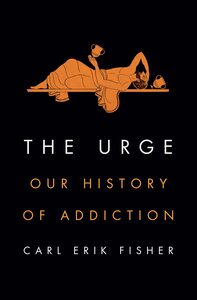Take a photo of a barcode or cover
The Urge is a truly wonderful and unique way of enjoying the history of addiction whether you are new to the topic or rather familiar with it. Weaving personal stories from his patients with examples from literature, popular culture, and intimate pieces of his own reality as well.
Perfectly laid out this book is a welcome gem to the genre of addiction literature and the brilliance of Carl Erik Fisher shines once again.
Thank you so much to netgalley and publishers for providing an e-copy for me to read and leave my honest opinion. This is a subject that has always fascinated me and I am happy to say this book did not disappoint! Don't forget to pick up your copy as soon as possible!
Perfectly laid out this book is a welcome gem to the genre of addiction literature and the brilliance of Carl Erik Fisher shines once again.
Thank you so much to netgalley and publishers for providing an e-copy for me to read and leave my honest opinion. This is a subject that has always fascinated me and I am happy to say this book did not disappoint! Don't forget to pick up your copy as soon as possible!
challenging
hopeful
informative
inspiring
reflective
medium-paced
Fun(ny) fact(s): I first learned about this book from the PBK's 2023 summer reading list of all places?
Favorite quote/image: "Addiction is profoundly ordinary: a way of being with the pleasures and pains of life, and just one manifestation of the central human task of working with suffering. If addiction is a part of humanity, then, it is not a problem to solve. We will not end addiction, but we must find ways of working with it: ways that are sometimes gentle, and sometimes vigorous, but never warlike, because it is futile to wage a war on our own nature." (pg. 300)
Honorable mention: "Science can be a powerful tool in social movements, and scientific stories about substances are easily twisted to fit the dominant prejudices of the time...the actual science didn't really matter; it was all retrofitted onto the existing story of possession. Science was just being used to bolster claims that seemed self-evident." (pg. 90-91)
Why: Interweaving his own personal story of addiction with a global history of addiction, Fisher brilliantly and compassionately tells a story of humanity's response to addiction, highlighting different frameworks for understanding addiction, policies, and treatments, challenging readers to question their own stereotypes of addicts and where those preconceived notions came from. As a psychiatrist himself, he offers critical insight into attempts to understand and treat addiction, but also as a recovering addict himself, he shows the human side of suffering, making this about people and not just statistics. This is book is not just about the addiction of a few, but a story about power of a few and the suffering of many, especially in communities of lower socioeconomic status and of color.
Favorite quote/image: "Addiction is profoundly ordinary: a way of being with the pleasures and pains of life, and just one manifestation of the central human task of working with suffering. If addiction is a part of humanity, then, it is not a problem to solve. We will not end addiction, but we must find ways of working with it: ways that are sometimes gentle, and sometimes vigorous, but never warlike, because it is futile to wage a war on our own nature." (pg. 300)
Honorable mention: "Science can be a powerful tool in social movements, and scientific stories about substances are easily twisted to fit the dominant prejudices of the time...the actual science didn't really matter; it was all retrofitted onto the existing story of possession. Science was just being used to bolster claims that seemed self-evident." (pg. 90-91)
Why: Interweaving his own personal story of addiction with a global history of addiction, Fisher brilliantly and compassionately tells a story of humanity's response to addiction, highlighting different frameworks for understanding addiction, policies, and treatments, challenging readers to question their own stereotypes of addicts and where those preconceived notions came from. As a psychiatrist himself, he offers critical insight into attempts to understand and treat addiction, but also as a recovering addict himself, he shows the human side of suffering, making this about people and not just statistics. This is book is not just about the addiction of a few, but a story about power of a few and the suffering of many, especially in communities of lower socioeconomic status and of color.
informative
medium-paced
informative
sad
slow-paced
hopeful
informative
inspiring
slow-paced
challenging
hopeful
informative
fast-paced
slow-paced
informative
slow-paced
hopeful
informative
reflective
fast-paced
informative
reflective
medium-paced
If you are in recovery and looking for something a bit at arm’s length, that will provide you with information to understand yourself better without preaching to you— this is the book. I learned so much and it felt like a breath of fresh air. I got really stressed out at the “recovery” section, though, where it pointed out information I had not known regarding abstinence vs. moderation, so major trigger warning for that because I was really unprepared for it. Fisher writes from an informed and empathetic standpoint, and the combination of these traits in a medical professional was so healing lmao.
It is a heavily American history, so make sure that’s what you’re wanting to get out of it or you’ll be disappointed. I studied American history in school tho, so obvs I was fine. I do agree that the title should have probably said “an American history” or smth.
Not to @ any single reviewer, but I saw a lot of reviews essentially wishing to have seen more of his own personal trauma and the personal trauma of his clients. As someone in recovery, I’d ask why you’d want more of this in a history book. I thought the balance of it was perfect to situate the main theme (general history) alongside his own history and that of his clients. I am gonna make an assumption that he is extremely aware of the possibility for a “true-crime/ trauma porn” esque reading of this book and probably limited it partly to focus on the main theme of American history and partly for this reason. And as someone in recovery, I really appreciated that. We don’t need your pity or your shock. We need you to be informed, and that means learning our history in both the largest and most personal ways possible. Which I think this book balanced exceptionally well.
I’d recommend this to recovering and non-addict folks alike!
It is a heavily American history, so make sure that’s what you’re wanting to get out of it or you’ll be disappointed. I studied American history in school tho, so obvs I was fine. I do agree that the title should have probably said “an American history” or smth.
Not to @ any single reviewer, but I saw a lot of reviews essentially wishing to have seen more of his own personal trauma and the personal trauma of his clients. As someone in recovery, I’d ask why you’d want more of this in a history book. I thought the balance of it was perfect to situate the main theme (general history) alongside his own history and that of his clients. I am gonna make an assumption that he is extremely aware of the possibility for a “true-crime/ trauma porn” esque reading of this book and probably limited it partly to focus on the main theme of American history and partly for this reason. And as someone in recovery, I really appreciated that. We don’t need your pity or your shock. We need you to be informed, and that means learning our history in both the largest and most personal ways possible. Which I think this book balanced exceptionally well.
I’d recommend this to recovering and non-addict folks alike!
Graphic: Addiction, Alcoholism, Drug abuse, Drug use, Mental illness, Racism, Self harm, Sexism, Forced institutionalization, Police brutality, Medical content, Medical trauma, Classism, Pandemic/Epidemic




